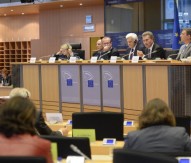
Improvements needed to integrate the “human factor” into work programme
Science Europe’s Scientific Committee for the Humanities has published an opinion paper denouncing a systematic failure to integrate humanities disciplines into the Societal Challenges of the Horizon 2020 Work Programme 2014-15.
The paper investigates and analyses the extent to which work programmes for the challenges have facilitated such integration so far. It shows that over 90% of the topics are actually not open to the humanities and the range of humanities expertise being called upon in the remaining 10% of the topics is rather narrow. The report adds that humanities is mostly seen in a “translational role” as the final step from research to market, rather than being an integral part of the research process.
“The committee strongly supports Horizon 2020’s Societal Challenges,” said Professor Kirsten Drotner, chair of the committee and co-author of the opinion paper. “This is why we have continually been pointing to an important precondition that is essential to the ultimate success of the challenges: the full and systematic integration of the ‘human factor’ at all stages of the research process.”
The committee insists on the importance of such integration because it has already been proven to have made a significant difference to a broad range of social issues. The paper proposes a coherent portfolio of actions that would enable collaborations of this kind to be included in subsequent work programmes and consequently improve the quality of the responses to the challenges.
“If our proposed actions are adopted, there will be a real possibility for breakthroughs and discoveries that will help us to understand and bring about change,” the paper says. “Above all, this will lead to a better understanding of how to bring about the fundamental changes in our behaviour that are needed to make progress towards the Societal Challenges.”




